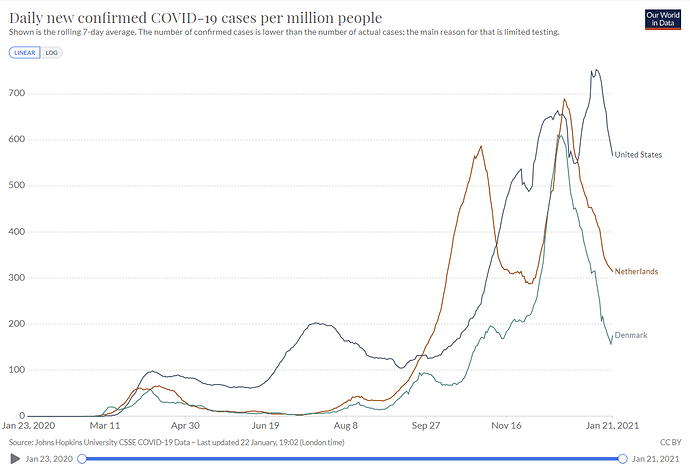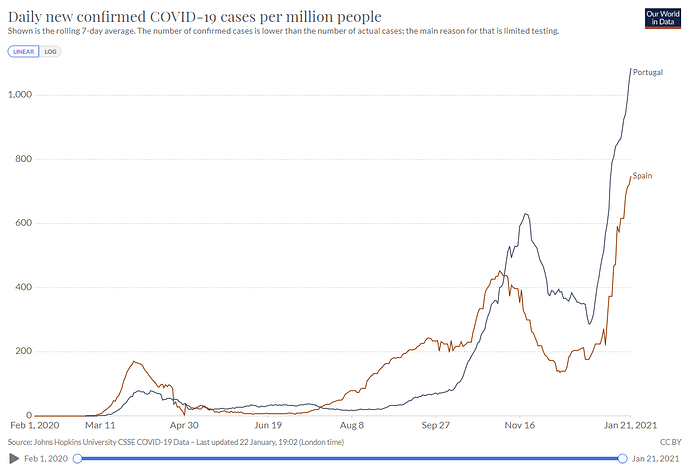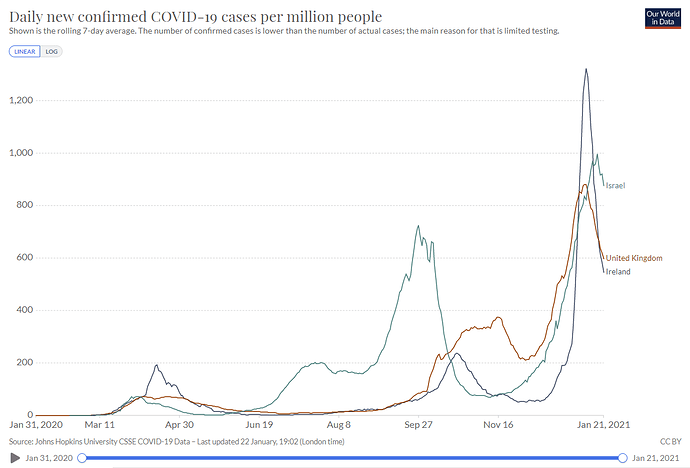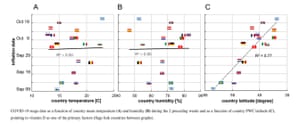Good summary of the current state of vaccine supply. Answered a ton of my questions.
Friend posted a picture with herself and several dozen people, none of which were wearing masks at a Burns Festival in Australia.
Are things good enough to have large gatherings in Australia?
Cases are linked to travellers arriving in the UK, rather than community transmission, Matt Hancock added.
He told the BBC’s Andrew Marr cases were under “very close” observation and enhanced contact tracing was under way.
Scientists have said there is a chance the South African variant may harm the effectiveness of current vaccines.
I’m so confused by the vaccine rollout. I can’t figure out the angle. Is it just shear global incompetence? Is it that simple? I can’t see the grift angle.
Factory upgrades now, not 6 months ago?
Why are they not converting tons of medical factories to produce vaccine?
Why are there not 24 hour a day vaccine centres with people having appointments all day and night?
It could have something to do with 10,000,000,000 orders for a newly approved product IMO. Apple with their iPhone and Sony seem to have a problem meeting new model demand initially, for a fucking playstation :)
The vaccine companies didn’t have the results of 3rd stage trials 6 months ago - unlikely to build capacity for production until you know it works? Same with regulatory approval which was first given what, 6 weeks ago in UK, 5 weeks in USA etc. Tne vaccine co’s seems to be implementing expansion now, hence the delivery delays.
Because they are making other medicines to meet world demand? I’m not so sure there’s tons of medical factories sat around with spare capacity to try something new.
There are 24/7 facilites - just not in your area yet I guess.
It’s called triage. Maybe we don’t need the same amount of chicken pox vaccine right now.
I also don’t buy for a second the factory upgrade had to wait to now. Makes zero sense.
UK Variant Prediction: -
Before…
During…
After…
UK variant ‘quadruples cases’ apparently, so long as you lock the fuck down the minute it hits (and are aware it’s coming)
Different states have different rules. Only 2 states, New South Wales and Victoria require face masks and only while indoors.
The last locally acquired case (not including mandatory hotel quarantine for anyone arriving from overseas) was 7 days ago in NSW, longer in other states.
There hasn’t been any deaths in Australia from Covid this year, there was 1 in December and 1 in November.
Plenty of data here if you’re interested: Australia's COVID-19 case numbers — ABC News data charting the spread of coronavirus - ABC News
Also, I’m not an expert but would assume something like 90% of the facility is the same no matter what vaccine you are producing.
As an end user I’d have been pleased too but who is “they”?
I have no idea what in the world you are trying to show here
Israel expanding vaccinations to 16-18 year olds
Israel is expanding its Covid vaccinations to include 16- 18 year olds in order for them to take school exams, the government says.
The country has one of the highest vaccination rates in the world against coronavirus. According to its health ministry, it has administered at least one dose to more than 25% of its population since 19 December.
Vaccines are currently available to those over 40.
A spokeswoman for the country’s education ministry said the addition of the 16-18 year-olds allows their return to school and the “orderly holding of exams”.
Prime Minister Benjamin Netanyahu, who is campaigning for re-election, has predicted Israel could emerge from the pandemic as early as February. It is currently in its third national lockdown.
Anthony Fauci, the top US infectious disease expert, said on Thursday that rolling average data appeared to show infections levelling off.
Although the national picture has stabilised slightly, he warned the country remained in a “very serious situation”.
The Center for Disease Control and Prevention (CDC) is particularly concerned that new variants could accelerate the virus spread.
It issued a warning that the new more transmissible strain first detected in the UK could become the dominant strain across the US by March.
The strain has been detected in 20 states, Dr Fauci said Thursday, but warned the country had “limited ability” to track its spread through the population.
Again, still no idea what in the world you’re trying to say. AFAICT, you posted some nonsense about before/during/after with different countries in each graph in attempt to say… no idea.
I don’t follow this, but he appears to be saying that the UK variant first hit in the UK, Ireland and Israel, then it hit in Spain and Portugal, and now it’s hitting in the US, the Netherlands and Denmark. And, obviously, that something about what happened in the places it first hit helps predict what will happen in places it hit later.
It’s absolutely nuts that govts didn’t do that. I wrote a blueprint for doing exactly that in one of these threads, like back last March or April or sometime early on. And I’m a barely functioning adult.
President Biden’s administration has also re-engaged with the World Health Organization (WHO) and is joining its Covax programme to help ensure vaccine access worldwide. The move was welcomed by WHO chief Dr Tedros Adhanom Ghebreyesus.
In the US, many of the reasons are systemic. The same reason that all the things you’ve listed were not done, is the same reason why we have a nine-figure annual war making budget or give trillion dollar tax cuts to corporations, but we didn’t have PPE stocked up prior to the pandemic. And it’s the same reason we are 30+ years behind on addressing climate change. The system we live in prioritizes profits over people. The system has the grift built right into it.
100% correct. It is absolutely nuts. The reason why jbro is able to produce a better blueprint for action is because his primary goal was solving a public health crisis rather than how to make a profit.
‘Extremely foolish’ not to urge vitamin D supplementation for all, says scientist
After research published in Scientific Reports showed an “impressive linear correlation” between European countries’ latitude and the date of their autumn Covid surge, and pointed to vitamin D levels as a contributory factor, there are calls to rapidly address deficiencies of the sunshine nutrient across the continent.
Jon Rhodes, an emeritus professor of medicine at the University of Liverpool, said:
This study confirms previous reports showing associations between Covid-19 risk and latitude and this fits with its evident seasonality. The risk of dying from Covid-19 correlates with ethnicity, obesity, and also with lack of sunlight /ultraviolet exposure - whether as a consequence of latitude, season, or by being institutionalised. All these factors are strongly associated with vitamin D deficiency.
Vitamin D deficiency impairs immune function and a recent study has shown this can be readily corrected by daily supplementation. Doctors, many of whom take vitamin D supplements themselves, know that placebo-controlled interventional trials are not the only form of useful scientific evidence – smoking and lung cancer being a classic example.
We know about half the UK population are likely to be vitamin D deficient. It is extremely foolish not to urge daily vitamin D supplementation for everyone during the pandemic - it is very cheap and safe, at worst will do no harm, and at best might be lifesaving for many.
The study’s author, Stephan Walrand, from Cliniques Universitaires, the largest hospital in Brussels, Belgium, wrote in the peer-reviewed paper:
As already evidenced by previous correlation studies, a low [vitamin D] concentration should be considered a contributing factor to Covid-19 severity. Europe and the northern USA are starting a long Covid-19 crisis this autumn, as they will return to a level above the October sun UV daily dose only at the end of March 2021. Measures to reduce the pandemic severity during the coming winter using controlled preventive vitamin D supplementation should be considered.
A graph from the study shows no correlation between temperature or humidity and Covid surge dates, but a stark relationship with latitude. Photograph: Scientific Reports
Research suggesting a link between low vitamin D levels and the worst Covid outcomes is growing. There are many dozens of observational studies from around the world that make such indications, along with a randomised control trial (RCT) from Andalusia, Spain.
In the study, conducted in early September, 50 patients with Covid-19 were given a high dose of vitamin D, while another 26 patients did not receive the nutrient. Half of patients who weren’t given vitamin D had to be placed in intensive care, and two later died. Only one patient who received vitamin D required ICU admission, and they were later released with no further complications.
The researchers are now doing a much larger trial across a number of hospitals. Meanwhile, results are expected in the coming weeks from a large French trial that was reportedly named a “national research priority” by the French government in December.
An RCT with 6,200 patients was launched in the UK with charitable funding in October to examine whether vitamin D supplementation reduces the risk and severity of Covid-19 and other acute respiratory infections.
You guys don’t put Vitamin D in your milk in the UK?
(doesn’t look like it)



